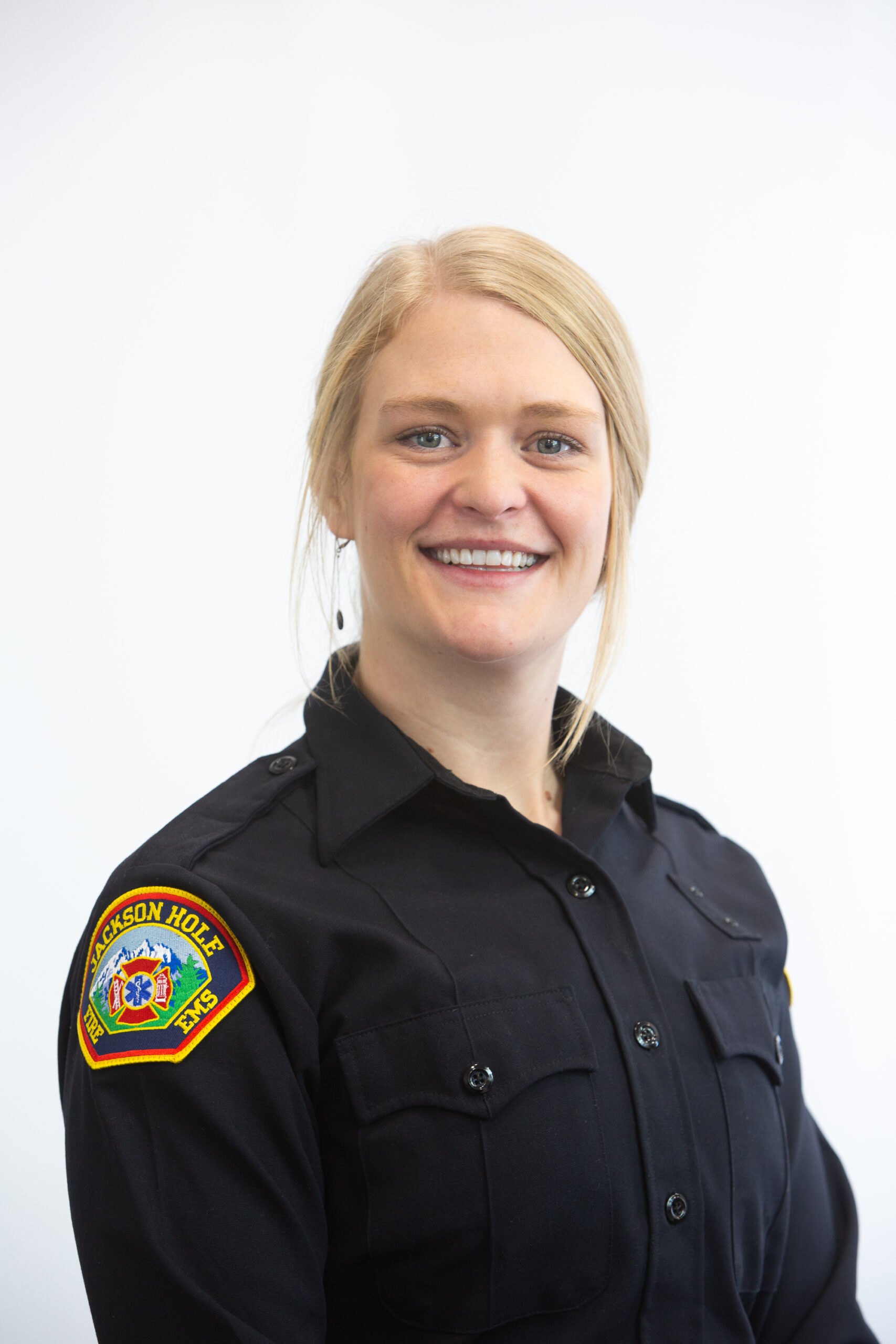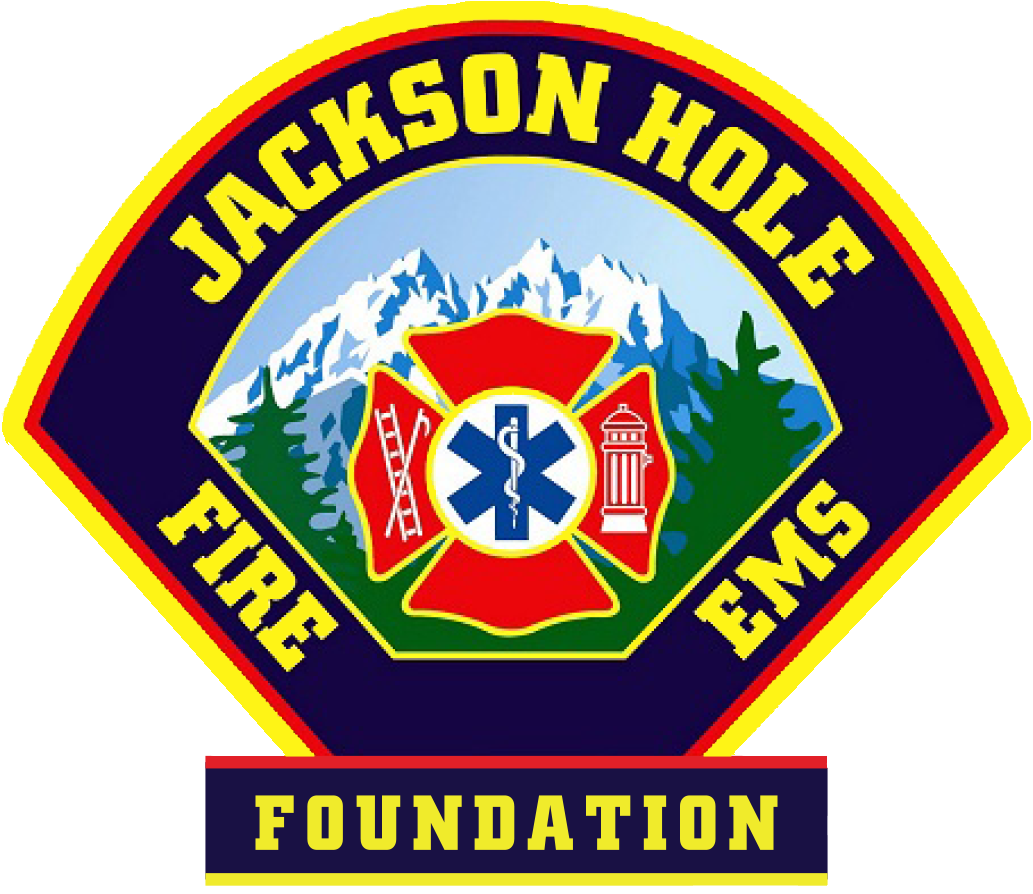
“Breathe deeply: it’s going to be okay.”
Elizabeth Gerrits
Elizabeth Gerrits
Probationary FFI
Present
Where are you from? I am from Port Washington, Wisconsin.
And how did you come to Jackson? I worked for the Park Service in Glacier National Park for three years and then in Yosemite National Park for two years. Then I came to Grand Teton in 2019 to work for the park.
What were you doing for the park? I was an education and interpretation park ranger, so I did curriculum-based education programs in the winter and then in the summer I did interpretive programs and visitor center operations. Now I do development at the Jackson Hole Historical Society and Museum.
What, in your words, would you say is your role in the department? I feel like my role is to be a sponge and just learn everything I can. Also, to try to be present as much as possible.
So you just joined obviously. What made you want to join in the first place? What was your inspiration? When the pandemic first hit, I remember just feeling really useless and trying to figure out how I could help the greater good. If a pandemic ever hit again, I wanted to make sure I had some kind of skill set to be able to give back and help the world. So that inspired me to take my EMT class a couple of years ago. It was actually during the pandemic and I really loved it. I was trying to figure out how and where I could help and really struggled for a couple of years until I moved from the park to town and applied to be part of the department.
Do you have friends or family who are firefighters? Because I feel like your general layperson isn’t like, ‘I want to be a firefighter.’ Yeah, being a firefighter wasn’t really part of the dream. It’s just a part of the process I suppose. The EMT part is what drew me in and what I was really shooting for. Being a firefighter was just a bonus to what we’re supposed to do and it’s so cool. I am definitely not upset that I am a firefighter I just never expected to be a firefighter.
How was it? How was Fire Academy? Oh, it was tough. I really felt there were moments during my training where I felt a gender dynamic and that was really challenging for me emotionally. I felt like the people around me didn’t think I was capable of doing all the skills. I didn’t feel supported by some of my fellow students and instructors so it definitely took some time to work through and figure out how to be a woman in the fire service and how to work through the challenges that come with that. But it was also very fun, I feel like I learned a ton. I remember working through the fear of the SCBA; that was the first challenge to overcome. Then overcoming the fear of running into a burning building and not being able to see anything and to have all of your fight or flight senses going off. I would tell myself, ‘I’m okay, this is what I’m supposed to do…I am the one that’s going to come help my community in their time of need.’ To work through some of these fears and challenges is so tough…I worked a lot with my coach on stress management and how to work through the instincts that are triggered in stressful environments.
What were the ways that you came up with to deal with those challenging gender dynamics that you experienced? I cried a lot. There were moments that I was physically being moved out of the way…So that was tough, but what I attempted to do was to ask for support in the ways that I needed. Like, instead of you taking the tool from me and just doing it, I need some time to work through it and if you have feedback or suggestions, that’s great, but physically moving me out of the way is not helpful. I want to respect the process and respect the knowledge of those around me. It is very clear that the folks in the department are really good at what they do and they just want to teach. But there are moments for the students to stand back and watch and then there are moments to let the students struggle through the skill and learn from that.
What are your certifications right now? EMT, Firefighter 1, Hazmat Awareness and Operations and Redcard.
What are your future goals in the department? I really want to be an advocate for women who have a desire to join the department. I am also really excited about educational outreach and the community event piece of being on the department. I can’t wait to go to events like Touch-a-Truck, I want to be out there talking to the little girls encouraging them, like, ‘yeah, you could be a firefighter if you wanted to.’
Do you have other certs that you’re after at some point? I really liked Hazmat. So if there was going to be something that I would do, it could potentially be like an additional hazmat course. I also would love to get more into ropes rescue and swiftwater.
And what do you do in your free time?. Let’s see…right now, my free time is filled with skiing and snowboarding and mountain biking. In the summertime that’s the big one. I’m a volunteer board member of the Teton Disc Golf Club. I go to the gym…I don’t have a ton of indoor activities that I like to do. I like to cook.
What would you say is your favorite part of volunteering? I love just hanging out with my station team. They’re so lovely, so supportive and funny. I feel like they’re very welcoming and allow me to ask questions; they all help me learn and grow. I’m also the only new recruit now at Station 7, so that feels special because then I can ask any question and everyone can help because they are all so knowledgeable.
On the contrary, what would you say is the most challenging? Something that I observe at large department trainings when I look around the room is like okay there are 45 people here, three are women. I am curious how we, as a department, can try to change that. Also the diversity in the department…I think that is a really interesting situation that we have at our department. Such a large portion of the Jackson community is Latino, but yet that isn’t reflected in our department. I am curious how we can incorporate and recruit a more diverse member base. I think part of the problem is that there are so many barriers for entry. Not necessarily financial barriers, but time barriers. We dedicate so much time to training and to getting through the probationary year…someone who has a family, who’s maybe working a front line job, just doesn’t have six or eight hours a week to spend at the department getting trained up. So, that’s definitely a challenge.
This question is great for you because you just finished, but what advice would you give new recruits? Remember to breathe deeply: it’s going to be okay. Study a lot. Take the time to review material. And be a sponge. Learn all you can; it’s endless. When you’re in the thick of it, and when you think, ‘yeah my sponge is absorbed, it’s full…remember that it’s not.’ You never know how much you don’t know until you try to learn it and then you’re like, f*** I feel like I know even less than I did before.
Similarly, is there anything that you wish you had known when you started? Everyone’s wonderful, there’s just different learning and teaching styles throughout instructors and leaders. I wish there was a secret guide to knowing who has which teaching styles and I could figure out specifically who I think I would learn best from. Another thing that I wish I would have done is advocated for doing a ‘get to know you’ activity at the start of fire academy. As a previous environmental educator, getting to know you activities are such a core piece of building group dynamics. I realized after the fact that building community is one of my core values, and I felt like I was missing that in fire academy.
What would you say is the most valuable skill or trait for someone to have in this line of work? The ability to adapt your expectations, go with the flow, and jump in as needed. Flexibility and a willingness to do what needs to be done and not complain about it. For example in Fire Academy: everyone was going through the same challenges. We were out there in the snow, handling hose and no one wants to be doing that, it sucks for everybody. So getting out there and joining in on the misery, it really brings together the team. You get to a point where you just put your head down and do it; your team depends on you to get it done.
What do you feel you can contribute to the department? Great energy and a willingness to give anything a try. I also feel like I want to have some of these important conversations about where there is room for growth in the world of equity, inclusion, and diversity within the department.
Do you have someone in the department who is a mentor to you? Someone who you really look up to or has taken you under their wing and shown you the way a little bit? I feel like I really clicked with Caleigh Smith, she was the first one to get my number, and told me to text or call with any questions. That really meant a lot, especially since it was within the first few months of joining. Other than that, it would have to be Captain Sullivan. She’s awesome. I just love how she’s like, ‘I’m taking over because women run the world and that’s where we’re at.’
How do you strike a balance with family, friends, or whoever’s in your life here, in terms of leaving at all hours of the day, having a pager on, this huge time commitment that you’ve taken on…how do you manage that? We have a really detailed calendar and we set really clear expectations of what trainings I have coming up and what the time commitment will be. I mean, I only have one partner to balance life with, so I’m pretty lucky in that regard. I’m not responsible for a family or a dog or a cat. We definitely had some challenges in the beginning but we worked through that and we’ve set clearer expectations. The first structure fire call that happened was a good learning moment for us. When the pager went off, I had to get out of bed and run to the station. Since that was the first big call, when I got back, we were like, ‘Okay, let’s talk about that,’ and we laid out what would actually be helpful to do in the future. Now we have a system set in place for when the call does come in, we know exactly what to do.
